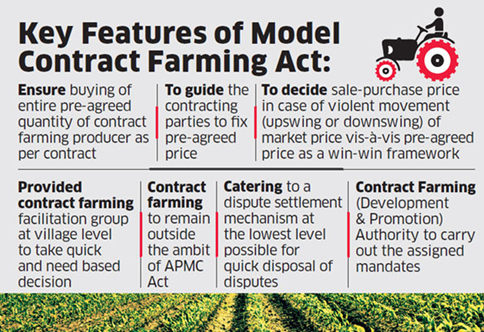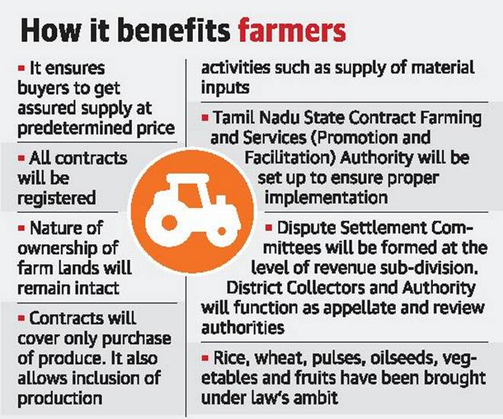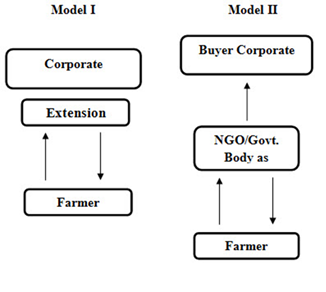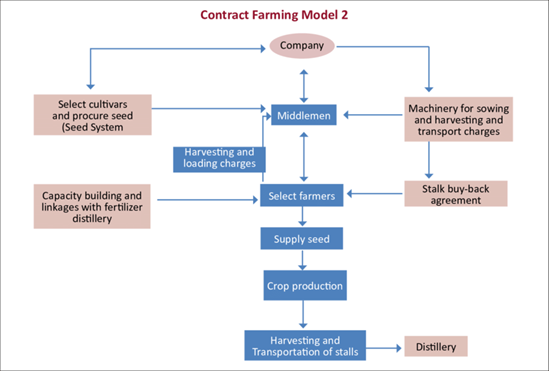PREVIOUS
Tamil Nadu’s contract farming law
November 16 , 2019
1888 days
12532
0
The story so far
- Tamil Nadu has become the first State to enact a law on contract farming, based on the lines of a model legislation put out by the Ministry of Agriculture & Farmers’ Welfare in May 2018.
- The law, Tamil Nadu Agricultural Produce and Livestock Contract Farming and Services (Promotion and Facilitation) Act of 2019, got the assent of President Ram Nath Kovind last month.
- The State Assembly adopted the contract farming bill in February, 2018.
Contract Farming Law
- The law defines it as a written agreement between a farmer and a buyer for producing an agricultural produce/product or rearing livestock.
- It covers a whole range of activities in the entire Agri-value chain — from pre-production to post-production.
- No genetically modified crops are permitted.
- Price, quantity and the delivery schedule are fixed during negotiations between the two parties.
- The law, which covers over 110 items of agricultural produce, requires every purchaser to register himself or herself with a designated officer.
- Likewise, every agreement has to be recorded with the officer concerned.
- There are two types of contracts
- one for production support (such as inputs’ supply) and purchase
- another, only for buying.
- The Act, while permitting farmers to lease out their agricultural land or premises to buyers, however prohibits the latter from “raising any permanent structure or creating any kind of leasehold rights” on lands of farmers.
- There would be no compulsion for either of the parties — farmers or purchasers — to sign contracts under the law.
- It would be “purely voluntary”.

Provisions of the act
- The Act provides legal protection to the farmers, producer companies and purchasers of agricultural produce for their business transactions.
- Many farmers in Tamil Nadu sell their agricultural produce to companies that make plant-based or crop-based products.
- These deals generally are pre-determined by a verbal assurance between the producer and the purchaser regarding the quantity that will be sold and the rate per unit (pieces, kilograms or tonnes) that would be paid for the purchase.
- However, the most common problem that the farmers face at the time of sale of produce is that the price of the produce falls in the open market resulting in the companies choosing to buy the item from the open market without honouring their promise.
- This leaves the farmers with massive amounts of unsold inventory and huge losses due to high input costs.
- This Act aims to put an end to the last-minute disappointment to the farmers.
- It also provides for the establishment of Contract Farming and Services (Promotion and Facilitation) Authority, which will be the body overseeing the implementation of the Act.
- The Authority will have ten members led by a Chairman and includes representatives from the agro-industries and farmers and a domain expert in the field of agricultural economics.

Products under this law
- The Act covers output of agriculture, horticulture, apiculture, sericulture, animal husbandry or forest activities.
- It, however, does not include those products that are illegal in India, banned or prohibited by law.

Tamil Nadu framed a separate law
- The absence of an exclusive legal framework on agreements for contract farming had been a matter of concern for authorities in the State.
- They were frequently being called upon to intervene and resolve issues between farmers and purchasers/firms including matters relating to delay in payment.
- Also, there is nothing categorical in the State’s Agricultural Produce Marketing (Regulation) Act, 1987, on the subject.
- Besides, the authorities were of the view that under the given legal provisions, they had a very little role to play in sorting out disputes over formal contract farming agreements.
- Small and marginal farmers may not prefer to go for litigation for reasons of affordability.
- As transactions between the farming community and private traders or firms have been generally informal, the State government, by enacting the law, hoped to formalise it.
- In March 2018, Tamil Nadu Finance Minister, in his Budget speech, announced that the State government would enact a law on contract farming to “sustain agricultural production and promote agro-processing industries”.
- Safeguarding the interests of farmers, especially small and marginal ones, in times of violent price fluctuations, and ensuring better prices for them are among the key reasons behind the law.

Mandates of the Act
- As per the provisions in the Agricultural Produce and Livestock Contract Farming and Services (Promotion and Facilitation) Act, producers of the crop and purchasers are supposed to enter into an agreement with the terms of the transaction, on a stamp paper of hundred rupees in value and document it with the designated officer at the district level.
- This document shall be considered as a contract between the two parties and will be enforceable by law.
- The agreement shall mention the sale price of the produce and the quantity that will be bought by the purchaser at the end of the crop cycle.
- In addition to these, the agreement can also specify the specific quality grade of the produce that is involved in the transaction.

Doable when there is a dispute on the agreement
- When there is a dispute on the contract, the parties can opt to settle the matter by mutual negotiation or by asking a third party to mediate between them.
- The Act also provides for the setting up of a Dispute Settlement Committee chaired by a Revenue officer of the sub-division of the district and three other members who are representatives of farmers or farmer producer organisations, the agro-industry and a domain expert.
- When mediation and negotiations fail between the contracting parties, the aggrieved party can approach the Dispute Settlement Committee for resolution.
- The Committee is mandated to resolve the matter within 30 days. Its decisions carry the force of decrees of a civil court.
- In case the parties want to appeal the decision of the Committee, they are also allowed to approach the District Collector.
- The authorities have been empowered to recover a decretal amount as arrears of land revenue.
- The collector’s orders can be challenged before the State Contract Farming and Services (Promotion and Facilitation) Authority.
Safeguards in the Act for farmers
- According to Section 22 (2) (1) of the Act, farmers are permitted to sell a portion of agricultural produce to others, after meeting commitments under the contract for production support and purchase.
- This clause, according to officials of Tamil Nadu government, will help farmers in instances similar to what was experienced by potato farmers of Gujarat early this year when PepsiCo had filed a case (which has been withdrawn).
About breach of contract or non-compliance
- If the contract is violated by either of the parties, apart from the compensation and damages that will be paid by the one who violates the contract, the two parties shall also be liable to pay a fine to the government.
- While the fine for purchaser will be up to Rs 15000, the farmer/producer will be liable to pay Rs 1500 as fine for contravention of the agreement.
ó ó ó ó ó ó ó ó ó ó
Leave a Reply
Your Comment is awaiting moderation.


